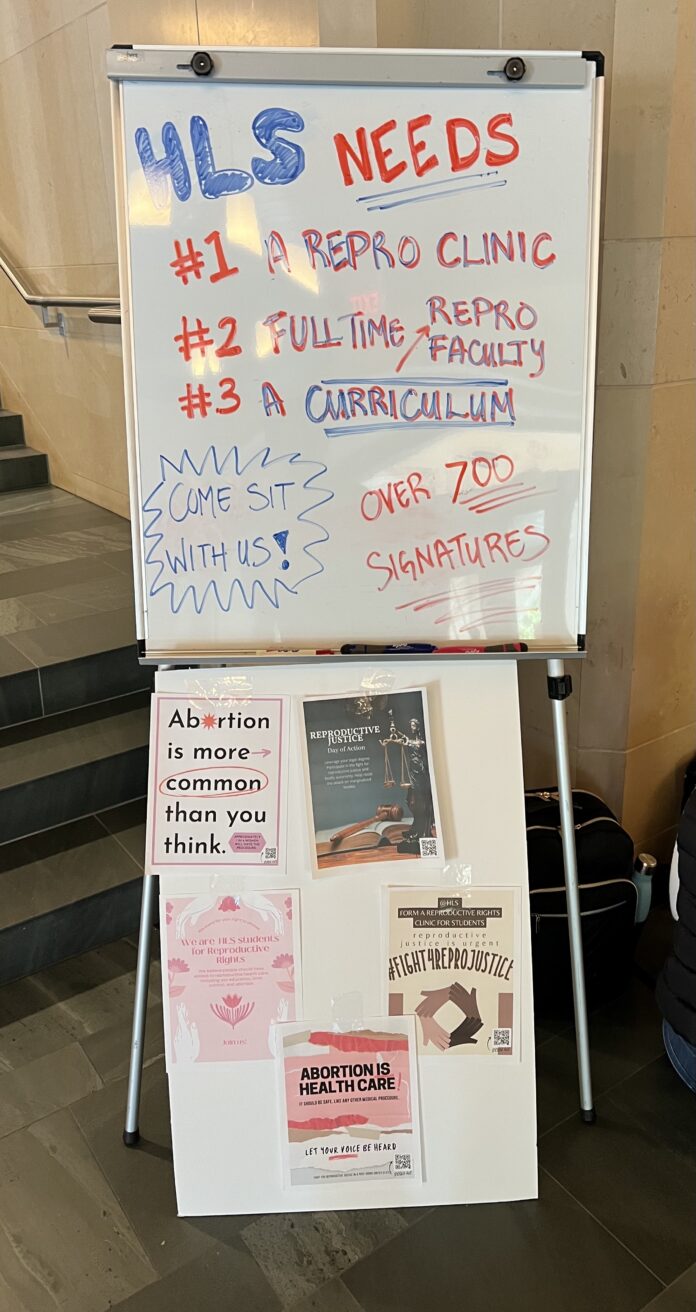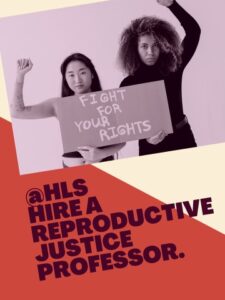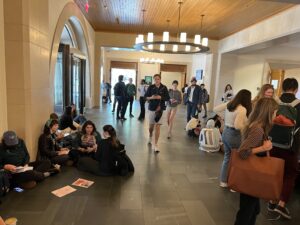
On Thursday, October 6, Harvard Law students engaged in a sit-in protest to draw attention to, and demand recourse with respect to, the law school’s extremely limited reproductive justice academic offerings. The protest comes just a week after about 75 law school students staged a walk out of an anti-abortion event put on by Harvard Law Students for Life.
From 8am to 5pm, students occupied the floor around the stairs to the second floor of Wasserstein Hall, near the building’s Mass Ave. entrance. The organizers, the Harvard Law School Alliance for Reproductive Justice (ARJ), distributed flyers and gathered signatures for a demand letter, while supporters spread out across the space.
In that demand letter, the organizers of the protest called attention to the ongoing “reproductive health care crisis” in the United States. After the overturning of Roe v. Wade this past summer in Dobbs v. Jackson Women’s Health Organization, the organizers note, accessing abortion care has ranged from impossible to prohibitively difficult. Further, they say, Dobbs has engendered threats on the associated rights of contraception, privacy, and even travel.
Even before Dobbs, note the organizers, abortion access was limited for many people—especially women of color.
“Reproductive justice is a broad campaign and calls for alignment and solidarity with movements for economic and racial justice, as much as an expansive conception of gender justice,” said ARJ co-president Kirin Gupta JD’23.

With that background, argue the organizers, Harvard Law’s refusal to offer any comprehensive reproductive rights clinic stands out, and not in a good way. While the Center for Health Law and Policy, Petrie-Flom Center, and Cyberlaw Clinic offer opportunities to work on reproductive health projects, the organizers note, those limited opportunities are not enough to prepare future lawyers to tackle the arcane challenges created by today’s restrictive abortion regime. Other schools, including Yale, NYU, and Cornell, the letter notes, have significantly more clinical opportunities devoted to reproductive rights and justice.
Just as glaring, note the organizers, is the lack of any full-time reproductive justice professor on the HLS faculty. While the organizers acknowledge that HLS has hosted visiting professors to teach reproductive justice electives, such inconsistent offerings (often with long waitlists) have been unreliable and insufficient—especially given the aforementioned increasing complexity of this area of the law.
Ultimately, the organizers argue, this lack of offerings “signal[] to students that 1) reproductive justice does not matter, 2) is not worth learning about, and 3) is not a viable career path.”
Those conclusions inform their demands, which are the creation of a reproductive rights clinic, the hiring of at least one full-time tenure track law professor “with a history of scholarship in reproductive justice and reproductive rights,” and multiple lecture courses on these issues.

At the sit-in, students expressed frustration with the law school’s inaction in the face of a clear need. “It’s emblematic of the lack of vision that the dean has at this school,” said one 2L, who preferred to remain anonymous. “I think it’s absurd given the impact of this issue and the pertinence of it on campus.”
“I will be graduating with much less expertise in my chosen field than I would like,” said ARJ policy chair Sam Nagler JD’23. “What we’re asking for from HLS isn’t radical. We’re simply asking that our school educate us.”
Students also emphasized the law school’s direct connection to the Dobbs decision. “Since Harvard Law produced so many of the justices that made this decision, it feels like the least they could do to train the next generation of lawyers to undo some of the harm and fight for reproductive justice,” said ARJ treasurer Jessica Grubesic JD ’24. “It’s about showing that the theoretical ideas floated by conservatives in the classroom have real impact—these ideas go on to materially impact our lives,” said Lisa Fanning JD’24. “We have a responsibility to push back, and the fight’s not over,” she added.
“The only thing that HLS did [after Dobbs] was send a letter of sympathy, without taking accountability or action for the decisions made by the people that they produce,” said Fatema Jaffer JD’24. “We are tired of the complicity that HLS has when these Supreme Court decisions come out, and we demand action. The least HLS can do is hire a professor and have classes on reproductive justice.”
“This protest is a significant amplifier to demands that students have been making — long before we arrived on campus and long before Dobbs,” said Gupta. “We were humbled by the energy so many law students brought today, and we are excited and hopeful for where this momentum can take us.”
As of October 7th, the letter had over 900 signatures. At the time of this story, the letter is still circulating, and the organizers plan to submit it to the administration on November 1, 2022. They have asked that the administration publicly respond by December 1, 2022.

